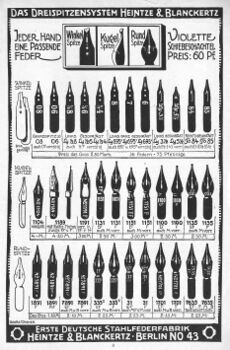Differenze tra le versioni di "Heintze & Blanckertz/en"
(Creata pagina con "{{CategorizeOtherBrand|Germania}}") |
|||
| (12 versioni intermedie di 2 utenti non mostrate) | |||
| Riga 1: | Riga 1: | ||
<noinclude></noinclude>[[File:190x-HeintzeBlanckertz-Nibs.jpg|thumb|upright|An advertisement of nibs <noinclude>from the company</noinclude><includeonly>of [[Heintze & Blanckertz]]</includeonly>]] | <noinclude></noinclude>[[File:190x-HeintzeBlanckertz-Nibs.jpg|thumb|upright|An advertisement of nibs <noinclude>from the company</noinclude><includeonly>of [[Heintze & Blanckertz]]</includeonly>]] | ||
| − | The <noinclude>company</ | + | The <noinclude>company</noinclude><includeonly>[[Heintze & Blanckertz]]</includeonly> was founded in [[1849]] (according to Wikipedia, "preisgekrönt 1862" is the date on some nib packages) by Rudolf Heintze and Heinrich Blanckertz in Oranienburg, initially producing linoleum, then distributing dip nibs. |
Around [[1867]] Rudolf Heintze left the company and Heinrich Blanckertz became the only owner. | Around [[1867]] Rudolf Heintze left the company and Heinrich Blanckertz became the only owner. | ||
Initially the company was based at Heiligegeiststraße 13. Around [[1856]] Blanckertz acquired the property at Fliederstraße 4 in Friedrichshain. Around [[1872]] the property at Gollnowstraße 11 was added and, from 1889, the property at Georgenkirchstraße 44. | Initially the company was based at Heiligegeiststraße 13. Around [[1856]] Blanckertz acquired the property at Fliederstraße 4 in Friedrichshain. Around [[1872]] the property at Gollnowstraße 11 was added and, from 1889, the property at Georgenkirchstraße 44. | ||
| − | In [[1887]] Rudolf Blanckertz joined his father's company as a representative and engineer and in [[1898]] founded the Rudolf Blanckertz Type Museum. After his father's death in 1908, Rudolf Blanckertz became the owner of the company and had a steel mill built in Oranienburg in [[1912]]. | + | In [[1887]] Rudolf Blanckertz joined his father's company as a representative and engineer and in [[1898]] founded the Rudolf Blanckertz Type Museum. After his father's death in [[1908]], Rudolf Blanckertz became the owner of the company and had a steel mill built in Oranienburg in [[1912]]. |
From [[1913]] he set up his own rolling mill and became the major German manufacturer of steel nibs. | From [[1913]] he set up his own rolling mill and became the major German manufacturer of steel nibs. | ||
| − | In [[1935]] | + | In [[1935]] the company was converted into a war industry. In [[1945]] the Oranienburg production facilities were destroyed, the remains dismantled by the Red Army, and the plant was nationalized. VEB Kaltwalzwerk Oranienburg was established at the site, which was modernized several times and produced cold rolled strip. The Georgenkirchstraße factory, which now belonged to East Berlin, was confiscated and became the property of the people (VEB) in [[1949]]. |
| − | The Frankfurt | + | <noinclude>The company was reestablished in West Berlin, but later moved to Frankfurt and then to Wehrheim. With the advent of the ballpoint pen, the market for nibs was reduced to artistic drawing and calligraphy; today the company is still active, operating mainly in the field of artistic crafts and drawing. |
| − | |||
References: [https://de.wikipedia.org/wiki/Heintze_%26_Blanckertz], [https://en.wikipedia.org/wiki/Heintze_%26_Blanckertz], [https://brandenburg.museum-digital.de/object/3601?navlang=de] | References: [https://de.wikipedia.org/wiki/Heintze_%26_Blanckertz], [https://en.wikipedia.org/wiki/Heintze_%26_Blanckertz], [https://brandenburg.museum-digital.de/object/3601?navlang=de] | ||
Available material: {{GenerateSmallBrandGallery|Heintze & Blanckertz}} | Available material: {{GenerateSmallBrandGallery|Heintze & Blanckertz}} | ||
{{CategorizeOtherBrand|Germania}}</noinclude> | {{CategorizeOtherBrand|Germania}}</noinclude> | ||
Versione attuale delle 11:30, 6 apr 2023
The company was founded in 1849 (according to Wikipedia, "preisgekrönt 1862" is the date on some nib packages) by Rudolf Heintze and Heinrich Blanckertz in Oranienburg, initially producing linoleum, then distributing dip nibs. Around 1867 Rudolf Heintze left the company and Heinrich Blanckertz became the only owner.
Initially the company was based at Heiligegeiststraße 13. Around 1856 Blanckertz acquired the property at Fliederstraße 4 in Friedrichshain. Around 1872 the property at Gollnowstraße 11 was added and, from 1889, the property at Georgenkirchstraße 44.
In 1887 Rudolf Blanckertz joined his father's company as a representative and engineer and in 1898 founded the Rudolf Blanckertz Type Museum. After his father's death in 1908, Rudolf Blanckertz became the owner of the company and had a steel mill built in Oranienburg in 1912. From 1913 he set up his own rolling mill and became the major German manufacturer of steel nibs.
In 1935 the company was converted into a war industry. In 1945 the Oranienburg production facilities were destroyed, the remains dismantled by the Red Army, and the plant was nationalized. VEB Kaltwalzwerk Oranienburg was established at the site, which was modernized several times and produced cold rolled strip. The Georgenkirchstraße factory, which now belonged to East Berlin, was confiscated and became the property of the people (VEB) in 1949.
The company was reestablished in West Berlin, but later moved to Frankfurt and then to Wehrheim. With the advent of the ballpoint pen, the market for nibs was reduced to artistic drawing and calligraphy; today the company is still active, operating mainly in the field of artistic crafts and drawing.
Available material:





